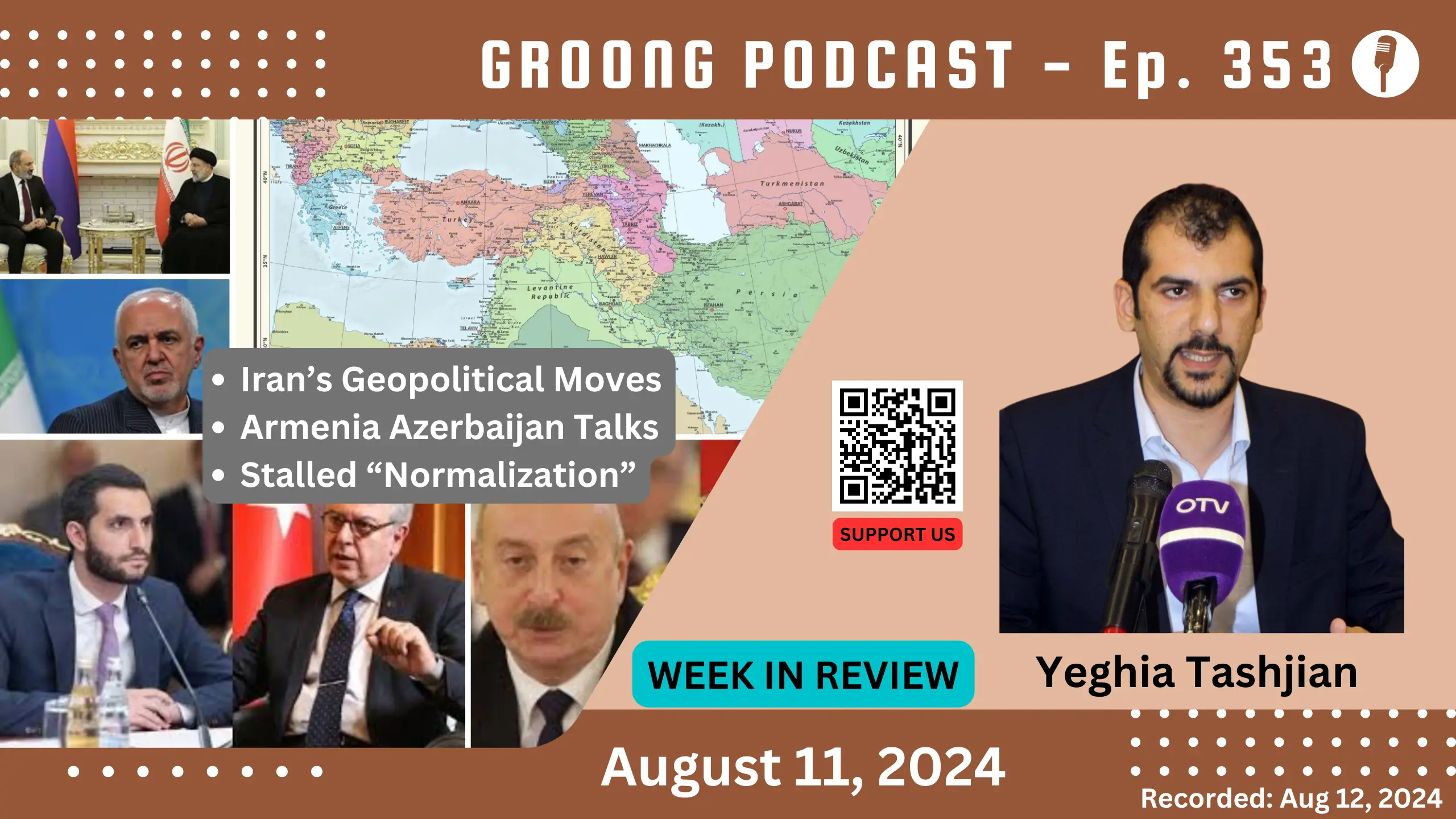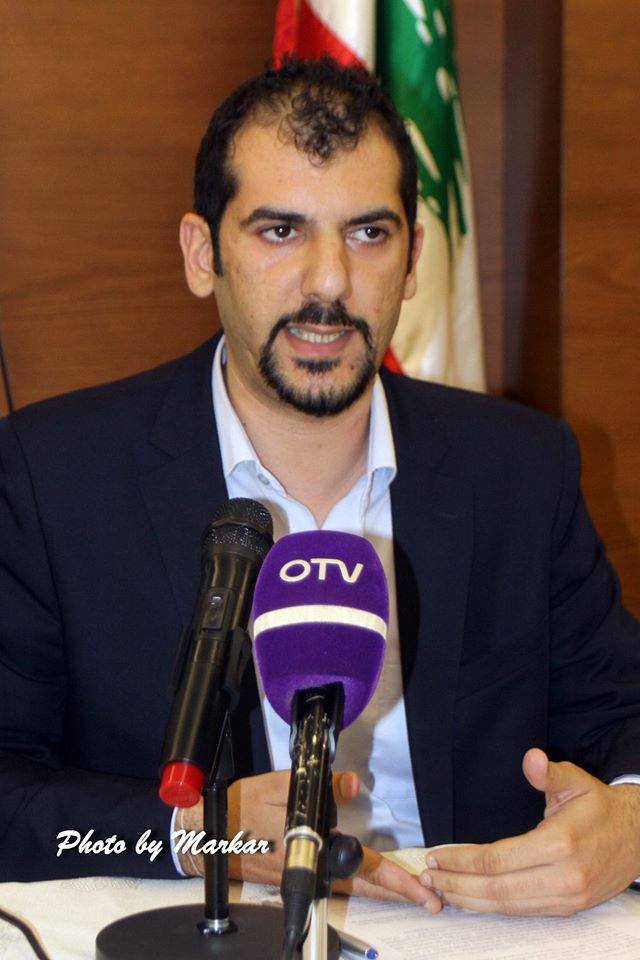Yeghia Tashjian - Iran’s Geopolitical Moves, Armenia Azerbaijan Talks, Stalled Normalization | Ep 353 - Aug 11, 2024 [EP353]
Posted on Tuesday, Aug 13, 2024 | Category: Armenia, Azerbaijan, Israel, Middle East | Series: wir
Groong Links:
Guest:
Topics:
- Iran’s Geopolitical Moves
- Armenia Azerbaijan Talks
- Stalled “Normalization”
Episode 353 | Recorded: August 12, 2024
Show Notes
Iran’s Geopolitical Moves
In Armenia
Two weeks ago on July 28th Iran inaugurated Masoud Pezheshkian as its new president. Pashinyan attended the events in Tehran and met with Ayatollah Khamenei, as well as Pezheshkian. The message to Pashinyan was that the change of presidents would not change Iran’s policy towards the Caucasus, and that they remain firmly opposed to any special corridors through Armenia.
Questions:
- As much as this might sound comforting to Armenians that Iran is warning Azerbaijan and Turkey not to touch Armenia, is there also a warning for Pashinyan here?
- Is Pashinyan “hearing” that warning?
- What’s at stake in Armenia for Iran?
- Are the stakes similar to India’s interests in the Caucasus?
This morning Pezheshkian’s foreign minister Mohammed Javad Zarif resigned, days after his appointment.
Questions:
- What does this mean for its relationship with the West, and negotiations on the JCPOA?
- Any affect on its policies towards the Middle East?
- How do you see either a Trump or Harris presidency affecting the policies in the region, towards Armenia, and towards Iran?
In the Middle East
Hamas political leader Ismail Haniyeh was also in Tehran to attend president Pezheskian’s inauguration, but he was assassinated by Israel’s Mossad. At the same time, Israel claimed to have assassinated a senior Hezbollah commander near Beirut.
Iran has vowed an unrestrained retaliation in the Middle East, and as a result many countries, including Armenia, have warned their citizens to either leave Lebanon immediately, or not travel there until further notice, given the rising tensions and potential of war between Israel and Lebanon.
Questions:
- Are we on the brink of the war in Gaza exploding into a larger, regional mess?
- Is there appetite on the part of the regional powers, like Iran, Israel, and Turkey, to expand into a larger confrontation?
- In April, Iran launched a large drone attack against Israel in retaliation for the killing of an Iranian general in Syria. That attack was widely advertised and came and went without great harm. Is the current situation similar, or is the potential for a wider conflict greater now than 6 months ago?
- Discussion on NE syrian Kurdish element
Last week Erdogan warned that Turkey could enter Israel, in his words: “just like we did in Artsakh”. Additionally, Turkey joined South Africa’s International Court of Justice (ICJ) case against Israel, in defense of Palestinian rights. But despite all the talk, the countries still maintain diplomatic relations, Azerbaijani oil flows to Israel through Turkey, and just this week a contract for Turkey to supply electricity to Israel was renewed.
Questions:
- Is Turkey serious about escalating conflict in the Middle East, or are these Erdogan’s standard populistic shenanigans?
- The current situation in Lebanon is tense. Is it mostly in south Lebanon, or do you feel it in Beirut as well?
Armenia Azerbaijan Talks
Armenia and Azerbaijan announced this past week that “unblocking regional transport links”, essentially meaning Azeri demands for the so-called Zangezur Corridor have been removed from the draft Armenian-Azeri agreement, in order to make it possible to sign some sort of an agreement. Aliyev’s representative, Elchin Amirbayov, said that by mutual agreement they removed the provision and they’d come back to it at a later stage.
Question:
- Why?
- Is it possible that Azerbaijan agreed to US pressure or enticement in order to remove obstacles to signing “something” soon, possibly before the elections in the US?
In the same interview Amirbayov said that Armenia changing its constitution remains another contentious issue. Meanwhile, Pashinyan’s timetable for a new constitution “from scratch” is in 2027. Let’s note that Armenia’s parliamentary elections are scheduled in 2026, and there’s no guarantee that the current deeply unpopular government will get re-elected.
Questions:
- Since they agreed to delay the transportation link issue, is it possible that they will come up with a clever way to delay this as well?
- Do the “mutual agreements” mentioned by Amirbayov include more verbal agreements by Pashinyan behind everyone’s back, and do they paint the next government of Armenia into a corner, with opaque international promises?
Recently US diplomats have been very clear in expressing the policy that the US is pursuing in the Caucasus, and that is to break it out of its orbit around Russia. Similarly the EU’s Toivo Klaar stated that Armenia and Azerbaijan need to find further political will and make tough compromises for the sake of the expected agreement.
Questions:
- Is there a sense of urgency on the part of the West to get this Caucasus policy to reach a milestone before the war in Ukraine simmers down, and Russia looks at Armenia again?
Stalled “Normalization”
Also two weeks ago there was a meeting between Serdar Kiliç and Ruben Rubinyan, the two representatives discussing Turkish-Armenian so-called “Normalization” of relations. Turkey reiterated that no steps could be expected until Aliyev greenlights the process.
Questions:
- We’ve known this all along, so what was the point, or the value of holding this meeting?
- Is the West the key beneficiary of an open border, or let’s say “normalized” relations between Armenia and Turkey?
- If there is some form of Normalization, what’s to be expected on issues such as the Armenian Genocide, and also in relations between Armenia and the DIaspora, because Turkey has done everything possible to help Pashinyan destroy those bonds.
Topics from the Panelists
- Hovik: Remember Armenian POWs in Baku and demand their release throughout the period of #COP29
- Yeghia: What if #COP29 presents an opportunity to bring back our POWs, would we do it? And: Reflections on the Beirut Blast, four years ago.
Wrap-up
That’s our Week in Review, we hope you found it helpful. We invite your feedback and your suggestions, you can find us on most social media and podcast platforms.
Thanks to Laura Osborn for the music on our podcasts.
Guests

Yeghia Tashjian
Yeghia Tashjian is an regional analyst and researcher based in Beirut, with expertise in China’s geopolitical and energy security interests in Iran and the Persian Gulf. Currently he is an instructor in International Affairs at the American University of Science and Technology and International and Regional Affairs Cluster Coordinator at the Issam Fares Institute for Public Policy and International Affairs at the American University of Beirut.
Hosts

Hovik Manucharyan
Hovik Manucharyan is an information security engineer who moved from Seattle to Armenia in 2022. He co-founded the ANN/Groong podcast in 2020 and has been a contributor to Groong News since the late 1990s.
Disclaimer: The views expressed by Hovik Manucharyan on the ANN/Groong podcast are his own and do not necessarily reflect the opinions of his employer or any other organization.

Asbed Bedrossian
Asbed Bedrossian is an IT professional, and for years oversaw the central IT enterprise infrastructure and services at USC. His decades of experience spanned across IT strategy, enterprise architecture, infrastructure, cybersecurity, enterprise applications, data center operations, high performance computing, ITSM, ITPM, and more.
Asbed founded the Armenian News Network Groong circa 1989/1990, and co-founded the ANN/Groong podcast in 2020.